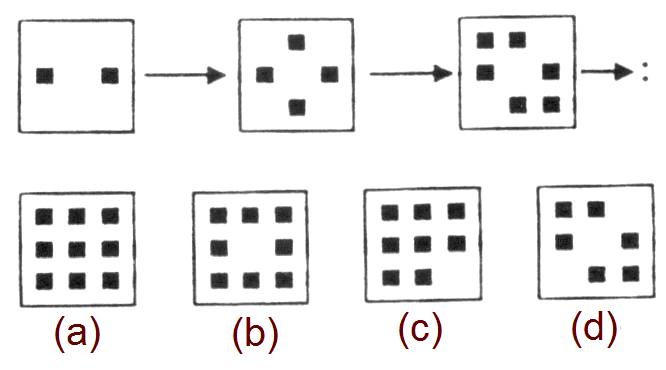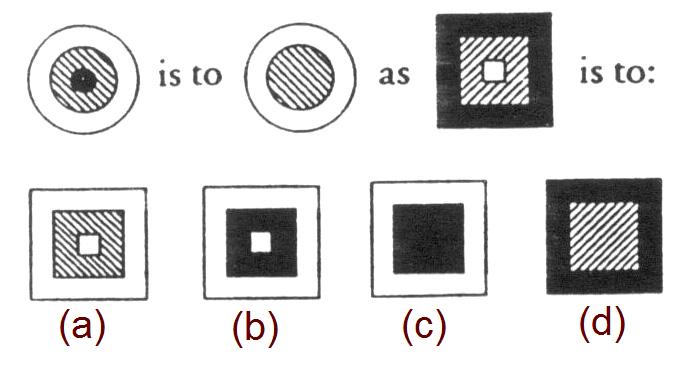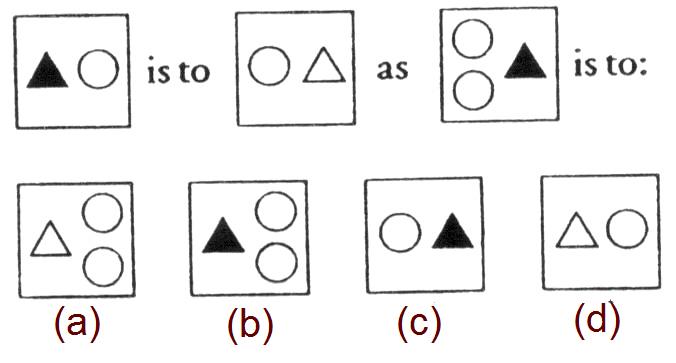Here's how this test was scored:
You were given one point for each correct answer.
One bonus point was added to your score if you completed the test in less than 25 minutes,
two points were added if you finished in less than 21 minutes,
and three points were added if you finished in less than 18 minutes.
If you scored:
23 - 18 points: You are exceptionally intelligent -- a perfect candidate for Mensa.
17 - 16 points: Your I.Q. should be in the higher percentiles of the population -- potential Mensa material.
15 - 14 points: Above average. You might want to try Mensa.
13 - 0 points: Mensa may not be for you, but don't worry about it.
Some people don't do well on quizzes, but do very well in real life.
1. You have just tossed a coin that has come up heads for the tenth time in a row.
What is the probability that it will come up heads the next time,
assuming the coin has not been tampered with?
2. Which box on the bottom row best completes the following series?

3. You are an employment manager in a land where there are only absolute liars and
absolute truth tellers. An applicant comes in to see you
and appears to be sincere.
He tells you that the
next interviewee has told him she is a liar.
Is he (a) lying or (b) telling the truth?
4. Which of the following scrambled words is the "odd man out"
when the words are unscrambled?
(a) CGHICOA (b) TTOOORN (c) IMMIA (d) CPOEHNANGE
Copenhagen is the only one not on the North American continent.
5. Five men competed in a car race.
There were no ties.
Will did not come in first.
John was neither first nor last.
Joe came in one place after Will.
James was not second.
Walt was two places behind James.
In what order did the men finish?
Who finished first? James
Who finished second? John
Who finished third? Walt
Who finished fourth? Will
Who finished last? Joe
6. What is the missing number in the following sequence?
3 7 15 _____ 63 127
7. If 40 pizza bakers can bake 20 pizzas in 2 hours,
how many hours will it take 2 pizza bakers to make 10 pizzas?
8. Ceylon is to Sri Lanka as Constantinople is to:
(A) New Hampshire (B) Leningrad (C) New York (D) London (E) Istanbul
9. "Birds of a feather flock together" means approximately the same as:
(A) All songbirds stick together.
(B) Feathered birds get along well.
(C) People tend to congregate with others like themselves.
(D) If you see a lot of birds together, they will probably be the same color.
(E) Birds without feathers are not accepted by birds with feathers
10. If Sally's daughter is my son's mother, what relationship am I to Sally if I am male?
(A) son (B) son-in-law (C) brother (D) brother-in-law (E) father
11. Mary won't eat fish or spinach;
Sally won't eat fish or green beans;
Steve won't eat shrimp or potatoes;
Alice won'teat beef or tomatoes;
Jim won't eat fish or tomatoes.
If you gave these fussy eaters a dinner party, which items from the following list could you serve?
green beans celery lettuce creamed codfish roast beef roast chicken
(A) celery, lettuce, and roast chicken
(B) celery, lettuce, and creamed codfish
(C) green beans, roast beef, and creamed codfish
(D) green beans, roast chicken, and lettuce
(E) All of the above
12. Complete this analogy:

13. All of my grandchildren are under 17.
All of my granddaughters are beautiful.
All of my grandchildren have red hair and blue eyes.
My oldest grandchild has long red hair.
The legal voting age is 18.
Which statement can be proved by the information given?
(A) My oldest grandchild may not yet vote.
(B) My oldest grandchild is a beautiful girl.
(C) My youngest grandchild may not yet drive legally.
(D) My youngest grandchild has short red hair.
All of the others may or may not be true, but you cannot tell from the information given.
The oldest grandchild could be a boy, for example.
14. Potatoes are to peanuts as apples are to:
(A) bananas (B) lilies (C) peaches (D) tomatoes (E) cucumbers
Both apples and peaches grow on trees, as both potatoes and peanuts grow underground.
15. A snail is climbing out of a well.
The well is 20 feet deep.
Every day the snail climbs up 3 feet and every night he slips back two feet.
How many days will it take the snail to get out of the well?
On the 18th day, he reaches the 20 foot level and climbs out; he doesn't have to fall back.
16. On your bookshelf you have 3 books in a set, Volumes I, II, and III,
in the usual order from left to right.
You also have a bookworm who is eating them up.
The pages of each are two inches thick; the covers are each a half-inch thick.
If the bookworm starts at the outside of the front cover of Volume I and
eats through to the last page of Volume III, how many inches has he bored through?
Put a set of books on the shelf and look at them.
If the worm started at the front cover of Volume I and ate through Volume II,
he would not have touched the pages of Volume I at all.
Volume II, with cover, would be three inches, and the worm would eat only the back cover of Volume III,
another half-inch.
17. Six thousand, six hundred, six dollars is written $6606.
Now write eleven thousand, eleven hundred, eleven in figures
as fast as you can.
18. A woman collects antique snuff boxes.
She bought two, but found herself short of money and had to sell them quickly.
She sold them for $600 each.
On one she made 20 percent, and on the other she lost 20 percent.
Did she make or lose money on the whole deal? And how much?
From the facts given, one cost her $500 and one cost her $750.
So, she paid $1250 for them and sold them for $1200, losing $50.
19. Complete this analogy:

Figures are reversed and color is deleted.
20. A young explorer called his expedition chief in great excitement to report
that he had just found a golden coin marked 6 B.C.
The expedition chief fire him. Why?
(a) Only silver coins were minted before Christ.
(b) There is no way that a coin could be marked B.C.
(c) The expedition chief was not interested in coins.
(d) There was no way to make coins before Christ.
Certainly no coins were minted indicating an era marked by someone who had not yet been born!
Here is an email that I received from Matt McCracken regarding some of the ambiguous questions on this test, and I think he makes some valid points:
I thought Iíd provide some brief feedback on one of the tests on your web page. I know you arenít the author of the test, but nevertheless I feel compelled to comment since youíve published it.
Regarding Mensa Test #5:
Question 4: ďOdd one outĒ questions are always frustrating because they have multiple correct answers. There is no empirical way to know which is more correct than the others, and therefore it requires guessing. With this one, for example:
∑ Miami is the only one without an ďoĒ in it.
∑ Copenhagen is the only one thatís not 3 syllables.
∑ Chicago is the only one that doesnít repeat a 2-letter sequence.
∑ Etc.
Question 8: This relies on trivial knowledge rather than on raw intelligence. Itís not ideal for Mensa tests since itís luck-based and illustrative of nothing about a personís actual IQ.
Question 11: You could serve any of those combinations and everyone would be able to eat something. The correct answer should be ďEĒ. If everyone needs to be able to eat everything, that should be clarified in the question. As written itís an ďanyĒ, not an ďallĒ.
Question 14: While itís true the banana plant is not technically a tree by botanical classification, it would be *extremely* nit-picky to expect the average test taker to know this since the plant functions for all intents and purposes as a tree. Also, you have to unwrap bananas to eat them, as with peanuts. You donít have to unwrap peaches.
Anyhow, sorry if this comes across as obnoxious. Iím just passionate about making IQ tests as unambiguous as possible since itís very frustrating to answer a question correctly but still get the question wrong. Hopefully itís feedback you can put to constructive use!